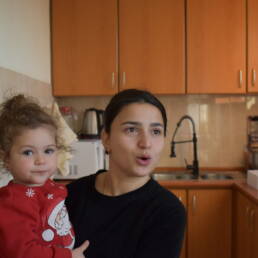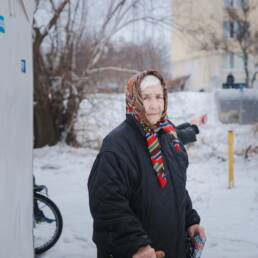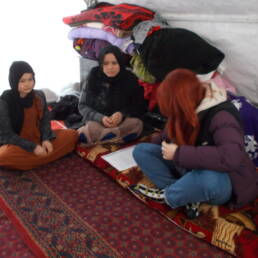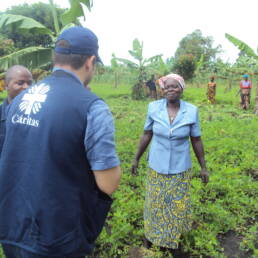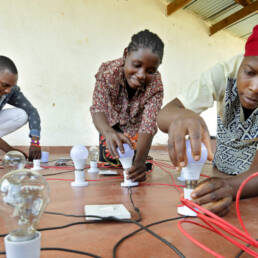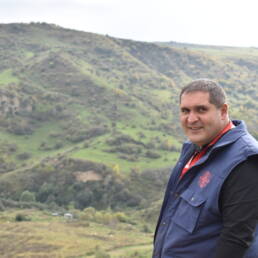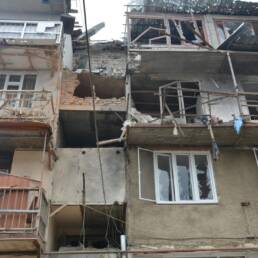Author
Susan Dabbous
Media Officer
Caritas Europa
Four months after the devastating floodings in Thessaly in which 17 people died, the situation is still dire in eastern Greece. “Many local inhabitants are still hesitant to drink water from the tap,” says Evelina Manola, Caritas Hellas Social Policy and Advocacy Officer. Here is her interview about Caritas’ response.
Evelina Manola, what is the current situation on the ground?
The situation on the ground in Thessaly is still very challenging. The floods have caused widespread damage to businesses, homes and infrastructures. The damage to the water supply network was a significant challenge, leaving over 260,000 people without access to drinking water when the flood hit in September. Now, people still avoid drinking tap water because of contamination. Not only private citizens but also businesses are affected. The agricultural sector is the most affected, considering that this harvest period is gone with substantial economic losses and according to studies that continue to be carried out, the ground will not be fertile for the coming years. Also, agricultural machinery worth thousands of euros were destroyed. The overall impact at the national level is the rise in fruit and vegetable prices.
What are the actions Caritas Hellas has taken so far?
As soon as the emergency occurred, we started making assessments in all the areas that were affected by the floods (Larissa, Volos, Karditsa). When we had a better picture of the situation in the field, we created a mobile unit consisting of social workers and a coordinator who began going door to door to do a deeper analysis and respond to the needs of the affected population.
Up until the end of November, we have provided psychosocial support to 653 people. Some of them have also received job counselling in order to be professionally empowered and supported in the search of a new job. We have also provided material aid to 697 people, such as cleaning supplies, food and sanitary protection items (masks, antiseptics) that have been provided by local donors.
In addition, thanks to our diocesan Caritas, we have collected and distributed essential items, such as shoes, rain boots and over 370 bags of clothes. Given the severe damages inside people’s homes, we also had to collect donations of mattresses and beds.
For the festive period, we are organising a mass collection of products at a Christmas stand in a main square encouraging the local society, which is already mobilised, to stand by us in this effort. We are also planning to distribute food vouchers to 100 vulnerable households.
How does Caritas reach the citizens in the affected areas?
 We created a mobile team of three people that goes to remote villages where people feel neglected. Our team registers the needs of each family, informs them about allowances they are entitled to and assist them in the application process.
We created a mobile team of three people that goes to remote villages where people feel neglected. Our team registers the needs of each family, informs them about allowances they are entitled to and assist them in the application process.
Depending on the needs and the vulnerabilities of each person, we offer psychosocial support through our social workers or we refer them to other agencies.
At the same time, we provide humanitarian aid, job counselling and we also help the affected people with practical matters. For example, a colleague from the mobile team found that a man suffering from severe disabilities needed a wheelchair and Caritas managed to provide one immediately.
What are the needs of the population?
In villages like Metamorphosis, Volos and Piniada, many inhabitants will never return to their homes from which they were evacuated by helicopter, given the water level (which reached the first floor of the houses) and the general status of devastation. Most of the people are still hosted by relatives. Others are in temporary shelters; I know 30 people living in a municipality sports centre in Palamas. Another fifty families live in the former refugee camp for asylum seekers in Koutsochiros. In all these centres for displaced people, Caritas provides psychosocial support, clothing and food. But generally, all these citizens who lost everything are in desperate need of new accommodation. The government has announced compensation and subsidies for those in need, including housing assistance and support to local businesses. But what we have seen so far is insufficient and many people have yet to receive financial aid.
Apart from the material damage, how are the local citizens?
Every day, we see the trauma and emotional toll this disaster has taken on the affected people. That is why our psychosocial workers help them cope with their losses and fears for the future. The floods have ruined not only the houses but also the agricultural fields and killed thousands of animals that used to graze in the plains of Thessaly and that were the local’s main source of income. The scenes of devastation are very striking.
The torrential rains came just after the prolonged fires in July and August. What is happening to the climate in Greece?
In the summer, the combination of the extreme heatwave, dry atmosphere and changes in the wind’s direction fuelled the wildfires that continued out of control for days. According to scientists, in 2023, the hectares of land burned in Greece hit the worst record in recent history. In August, the devastating fires also caused the death of many local citizens and migrants in northern Greece. 2023 was undoubtedly a landmark year for climate change awareness in the nation.
What is Caritas Hellas doing to combat climate change?
First of all, we try to understand what the climate crisis is, what are the consequences of it and how our societies can play a role in it. As an organization, we try to form environmentally friendly policies in the programmes we implement and we are also raising awareness in our communities to better understand the concept of co-responsibility and how everything is interconnected.
In fact, recently we launched a photo competition called “The Earth we share” in which few of the pictures show the beautiful landscapes of Thessaly and Evros before the floods and the fires that recently destroyed them. I find these pictures emotionally striking because we will never be able to see these places like that again. Generally, the pictures of the exhibition demonstrate how Greek citizens see nature as part of their life, especially when it comes to coexistence with natural landscapes, animals and livestock, perfectly aware that they are a precious resource to protect.




